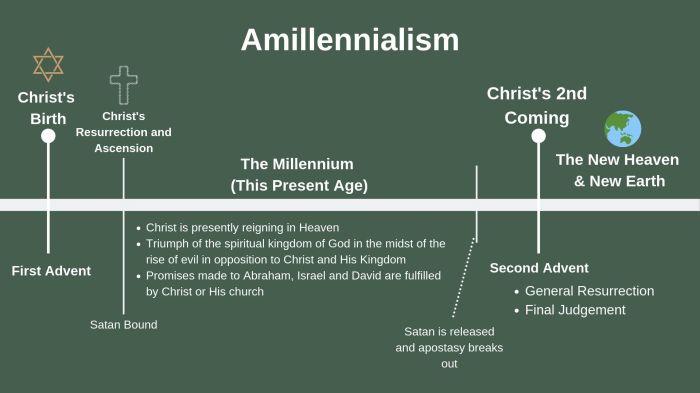Ever wondered what the future holds? Are you ready for a wild ride through time? Buckle up, because we’re diving headfirst into the world of Postmillennialism! It’s a movement that’s all about faith, hope, and a belief that the Kingdom of God is coming, one step at a time, with the power of the Gospel changing the world.
Think of it like a superhero story, but with a focus on transforming society through love, compassion, and good works. Get ready for a journey through history, theology, and the practical ways Postmillennialism shapes the lives of believers today.
This primer explores the core tenets of Postmillennialism, comparing and contrasting it with other eschatological views. We’ll delve into the optimistic eschatology that fuels this movement, unpacking its core principles and the role of human agency in bringing about the Kingdom of God.
We’ll then explore the practical implications of Postmillennialism in action, examining how it influences Christian life and practice, with examples of its impact on social justice, political engagement, and cultural transformation. And to top it off, we’ll take a deep dive into “A Postmillennial Primer” book, analyzing its arguments, strengths, and weaknesses, and how it contributes to our understanding of this fascinating movement.
Understanding Postmillennialism

Postmillennialism is a fascinating and often misunderstood eschatological view. It paints a picture of the future where the world is transformed by the gospel, not by a dramatic return of Christ. This view emphasizes the power of the Holy Spirit and the potential for human progress toward a more just and peaceful world.
Core Tenets of Postmillennialism
Postmillennialism is characterized by several key beliefs:
- The Church’s Mission:Postmillennialists believe that the church has a central role in ushering in the Kingdom of God on earth. They see the church as a catalyst for social, political, and moral transformation, working to establish God’s will in all areas of life.
- Progress and Perfection:Postmillennialists believe that the world is progressing toward a state of greater righteousness and peace, culminating in a “golden age” before Christ’s return. They emphasize the importance of human efforts in contributing to this progress.
- Christ’s Second Coming:Postmillennialists believe that Christ’s second coming will occur after a period of widespread Christian influence and social improvement. The return of Christ is seen as a glorious culmination of this process, rather than a sudden and dramatic event.
Postmillennialism Compared to Other Eschatological Views
Postmillennialism stands in contrast to other major eschatological views, such as premillennialism and amillennialism.
- Premillennialism:Premillennialists believe that Christ will return to earth before a thousand-year reign of peace, often referred to as the “millennium.” This period is marked by the establishment of a literal, earthly kingdom ruled by Christ. In contrast, postmillennialists see the millennium as a gradual process of Christian influence and social progress.
- Amillennialism:Amillennialists believe that the millennium is a symbolic representation of the present age, where Christ is already reigning spiritually through his church. They emphasize the ongoing spiritual battle between good and evil, rather than a literal, earthly kingdom. Postmillennialists, however, believe that the millennium is a real, historical period that will culminate in the return of Christ.
Historical Development of Postmillennial Thought
Postmillennialism has roots in the early church, but it gained significant traction in the 17th and 18th centuries, during the Enlightenment period.
So you’re digging into the whole “Postmillennial Primer Basics of Optimistic Eschatology” thing, huh? That’s some deep stuff, man. It’s like trying to solve a really tough riddle, but instead of a prize, you get a glimpse into the future.
Speaking of riddles, if you’re looking for some brain-tickling fun for the whole fam, check out The Ultimate Riddles Book for Kids Ages 9-14 300 Difficult Brain Teasers and Fun Riddles for Smart Kids and the Entire Family. It’s got enough riddles to keep everyone entertained for hours.
Anyway, back to the Postmillennial Primer – it’s all about how we can work towards a brighter future, and maybe even a little bit of a riddle-solving mentality can help us get there.
- Early Church Fathers:Early church fathers like Irenaeus and Augustine held views that could be interpreted as postmillennial. They emphasized the church’s role in spreading the gospel and bringing about a more just world.
- 17th and 18th Centuries:Postmillennialism gained prominence during the Enlightenment, a period marked by scientific advancements, intellectual inquiry, and a belief in human progress. Theological thinkers like Jonathan Edwards and John Wesley embraced postmillennialism, seeing it as compatible with the optimism of the Enlightenment.
- 19th and 20th Centuries:Postmillennialism experienced a decline in popularity in the 19th and 20th centuries, largely due to the rise of premillennialism and the growing sense of pessimism about human nature and the world’s future.
Optimistic Eschatology
Optimistic eschatology is a branch of Christian theology that focuses on the positive and hopeful aspects of the end times. It envisions a future where God’s Kingdom triumphs on earth, leading to a period of peace, justice, and prosperity. This perspective stands in contrast to more pessimistic views that emphasize the tribulation and judgment that precede the final victory of God.
The Core Principles of Optimistic Eschatology
Optimistic eschatology is built upon a foundation of core principles that shape its understanding of the end times. These principles emphasize the gradual transformation of society through the spread of the Gospel and the active participation of believers.
- The Gradual Triumph of the Gospel: Optimistic eschatology sees the spread of the Gospel as a powerful force for positive change in the world. Believers are encouraged to actively participate in spreading the message of Christ, believing that it will ultimately lead to the transformation of individuals, communities, and ultimately, the entire world.
- The Transformation of Society: Optimistic eschatology envisions a future where society is fundamentally transformed by the influence of the Gospel. This transformation is not a sudden event but rather a gradual process, as more and more people come to know Christ and live out his teachings.
This leads to a world characterized by justice, peace, and love.
- The Role of Human Agency: Optimistic eschatology recognizes the role of human agency in bringing about the Kingdom of God. Believers are not passive spectators waiting for God to act but are active participants in God’s plan. They are called to work for justice, spread the Gospel, and build a better world.
Postmillennialism in Action
Postmillennialism isn’t just a set of beliefs; it’s a way of life. It’s about seeing the world through the lens of God’s kingdom advancing, and actively participating in that advance. So, how does this belief system translate into real-world action?
Practical Implications of Postmillennialism
Postmillennialism encourages a vibrant Christian life marked by active engagement in the world. It emphasizes the role of believers in bringing about God’s kingdom on earth. Here’s how this plays out in various aspects of Christian life and practice:
| Area | Postmillennial Perspective |
|---|---|
| Social Justice | Postmillennialists believe that Christians should be actively involved in social justice issues, seeing them as opportunities to demonstrate God’s love and advance his kingdom. They often advocate for the poor, oppressed, and marginalized. |
| Political Engagement | Postmillennialists believe that Christians should be involved in the political process, working to influence laws and policies that promote justice and righteousness. They see political engagement as a way to create a more just and equitable society. |
| Cultural Transformation | Postmillennialists believe that Christians should work to transform culture by promoting Christian values and principles. They see culture as a battleground where the forces of good and evil are constantly clashing. |
Examples of Postmillennialism in Action
Postmillennialism isn’t just a theoretical concept; it has inspired countless individuals and movements throughout history. Here are a few examples of how Postmillennial beliefs have been applied in various areas:
Social Justice
Abolitionism
Many early abolitionists were motivated by Postmillennial beliefs. They saw slavery as a moral evil that needed to be eradicated, and they believed that God was working through them to bring about a more just society.
So, you’re into the whole “optimistic eschatology” thing, right? You believe in a future where God’s kingdom reigns supreme, and the world is a pretty awesome place. Well, check out this article, Now I See How God’s Amazing Grace Turned Betrayal Blindness and Heartache to Shining Joy , it’s a real tearjerker about how God can take even the worst stuff and turn it into something beautiful.
It’s a great reminder that even when things are tough, God’s got your back, and that’s the kind of hope that keeps the postmillennial fire burning.
The Social Gospel Movement
So you’re thinking about the future, right? Maybe you’re a Postmillennial, and you’re digging into the optimistic side of eschatology. You’re thinking big, like how to make the world a better place, and you’re probably wondering how to get the resources to make it happen.
Well, guess what? You’re not alone. Check out this awesome guide on grant writing: Grant Writing The Most Up-To-Date Guide to Finding the Best Funding Sources from Online Databases Writing Grant Proposals That Get Noticed and Getting Funding for Your Projects.
It’s packed with tips on finding the right funding sources, writing winning proposals, and actually getting the money to make your vision a reality. You’ll be a grant-writing ninja in no time, and you’ll be able to take that optimistic eschatology to the next level.
This movement, which emerged in the late 19th century, sought to apply Christian principles to social problems such as poverty, inequality, and injustice. It was deeply influenced by Postmillennialism and encouraged Christians to work for a more just and equitable world.
Political Engagement
The Religious Right
Yo, if you’re down with the whole “world getting better” vibe, you gotta check out the Postmillennial Primer Basics of Optimistic Eschatology. It’s like a roadmap for building a better future, and trust me, it’s way more hype than those dystopian movies.
Download And Listen Here to get your mind blown by this super-positive outlook on the future! The Postmillennial Primer is basically a guide to making the world a better place, one step at a time. So, get pumped, and let’s make the future awesome!
This movement, which gained prominence in the 1970s and 1980s, was largely motivated by Postmillennial beliefs. They believed that Christians should be actively involved in politics to advance Christian values and principles.
The Christian Coalition
This organization, founded in 1989, was a key player in the Religious Right movement. It sought to mobilize Christian voters to support candidates who aligned with their values.
Cultural Transformation
The Great Awakening
This series of religious revivals in the 18th century was a significant cultural event that transformed American society. It was fueled by Postmillennial beliefs, and it led to a surge of Christian activism and social reform.
The Christian homeschooling movement
This movement, which emerged in the 1970s, is motivated by a desire to provide a Christian education for children. It sees education as a key battleground in the cultural war and seeks to instill Christian values in the next generation.
Prominent Postmillennial Thinkers
Postmillennialism has been embraced by a wide range of thinkers throughout history. Here are a few prominent examples:* Jonathan Edwards:This 18th-century theologian was a key figure in the Great Awakening and a leading advocate of Postmillennialism. He believed that God was working through the church to transform society and bring about a golden age of peace and righteousness.
R.A. Torrey
This early 20th-century evangelist was a strong advocate for Postmillennialism. He believed that Christians should be actively involved in evangelism and social reform, working to spread the gospel and build a more just and righteous society.
Francis Schaeffer
This 20th-century philosopher and theologian was a key figure in the evangelical movement. He argued that Christians should engage with culture and work to transform it, seeing it as a battleground where the forces of good and evil are constantly clashing.
Book Review

“A Postmillennial Primer” by [Author Name] is a comprehensive exploration of the optimistic eschatology known as Postmillennialism. The book provides a thorough examination of the theological foundations, historical development, and practical implications of this view of the end times.
Summary of Main Arguments and Themes
The book’s central argument revolves around the belief that the Kingdom of God is progressively advancing on earth through the work of the Holy Spirit and the efforts of believers. The author contends that this advancement will ultimately lead to a period of unprecedented peace, prosperity, and righteousness before the second coming of Christ.
Author’s Perspective on Key Principles of Postmillennialism
The author’s perspective on Postmillennialism is rooted in a deep conviction that God’s purpose for humanity is to bring about a transformation of the world. This transformation is not solely dependent on divine intervention, but rather involves the active participation of believers in spreading the Gospel and building up God’s Kingdom.
Strengths and Weaknesses of the Book’s Arguments
Strengths
- The book offers a clear and concise explanation of the core tenets of Postmillennialism, making it accessible to a wide audience.
- The author provides compelling historical examples and biblical interpretations to support his arguments, drawing on a wide range of sources.
- The book explores the practical implications of Postmillennialism for individual believers and the church as a whole, encouraging active engagement in God’s mission.
Weaknesses
- Some readers may find the book’s optimistic outlook to be overly idealistic, neglecting the reality of human sin and suffering.
- The book’s reliance on specific biblical interpretations may not resonate with all readers, particularly those who hold different theological perspectives.
- The author’s emphasis on the role of believers in advancing God’s Kingdom could be interpreted as a form of social activism, which may raise concerns among those who prioritize personal piety.
Critical Evaluation of the Book’s Contribution to the Understanding of Postmillennialism
“A Postmillennial Primer” offers a valuable contribution to the understanding of Postmillennialism by providing a well-researched and engaging presentation of this often-misunderstood eschatological view. The book’s strengths lie in its clarity, comprehensiveness, and practical focus. However, its weaknesses, particularly its optimistic outlook and reliance on specific interpretations, may limit its appeal to a wider audience.
Conclusive Thoughts

So, are you ready to embrace a future filled with hope and possibility? Postmillennialism offers a unique perspective on the end times, encouraging believers to be active agents in shaping a world transformed by the love of Christ. This primer provides a starting point for exploring this compelling movement, sparking conversation and igniting a passion for a world where God’s Kingdom reigns supreme.
Questions Often Asked
What is the difference between Postmillennialism and Premillennialism?
Postmillennialism believes that Christ will return after a period of societal transformation brought about by the spread of the Gospel, while Premillennialism believes that Christ will return before a period of tribulation and then establish his kingdom on earth.
How does Postmillennialism differ from Amillennialism?
Amillennialism sees the Kingdom of God as already present in the church and focuses on the spiritual aspect of Christ’s return, while Postmillennialism emphasizes the gradual, outward transformation of society through the Gospel.
What are some examples of prominent Postmillennial thinkers?
Some notable Postmillennial thinkers include Jonathan Edwards, George Eldon Ladd, and Rousas John Rushdoony.
Is Postmillennialism a guarantee of a perfect world?
Postmillennialism doesn’t promise a perfect world, but it does envision a world transformed by the Gospel, where God’s will is increasingly done on earth. There will still be challenges and struggles, but the overall direction is towards a world more aligned with God’s plan.

